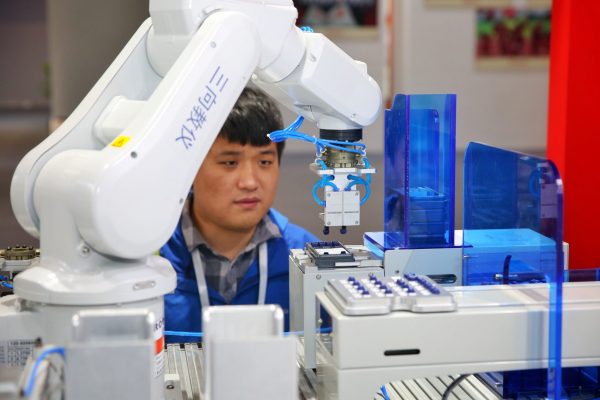Argentina’s focus comes at an opportune time. Governments around the world are exploring the best ways to seize the possibilities of the new economy while supporting those adversely affected by the transition.
Many fear that new technologies will take their jobs or their children’s. This fear is not new. History is littered with dire warnings about the widespread job losses that would result from new technology.
Such predictions have been wide of the mark (at least thus far). While technological change has rendered some occupations obsolete, it has also facilitated the creation of new jobs. Automation tends to take jobs away, while the invention of new complex tasks creates jobs.
In the history of technological advancement, the creation of new jobs has broadly kept pace with the loss of others. This means that there has been no secular rise in technological unemployment over that time. Importantly, with rising levels of education, people have risen to the challenge of mastering new complex tasks. This has meant that technological advances have raised overall income levels — technology has made us richer.
Technological change has not been a positive experience for all. Many developed countries have seen ‘job polarisation’ ― namely stronger growth in both high- and low-skilled jobs at the expense of mid-skill jobs.
One of the implications of job polarisation is arguably the rise in disaffected populations and populism in many advanced economies. People seek representation from those who sympathise with their lived realities (which are distinct from the realities of the urban elites).
There are steps that can be taken to ease technology’s impact for those adversely affected. One key policy is facilitating workers’ adoption of new technologies in their current jobs or their transition into new jobs that become available.
Some skills will be in traditional industries that technology finds hard to do, such as hairdressing. Many others will be in areas that only exist because of new technology.
The more challenging policy issue is managing the impact of those jobs that we cannot yet imagine.
There are indicators of where to start. Some jobs are clearly more vulnerable to automation than others. Machines are good at routine, repetitive, precise and predictable tasks, but they are less good at non-routine jobs ― those that involve creative effort, judgement or inter-personal skills.
Another consideration is technology’s impact on countries’ optimal development paths. Countries have traditionally tended to transition from agriculture to simpler manufactured industries before moving to higher-value technology manufacturing and service industries. This development path is now less obvious than it once was.
At any given level of income, countries are now less reliant on manufacturing as a proportion of employment and output than they were in the past. Economist Dani Rodrik suggests that this trend towards deindustrialisation earlier along the development path is due both to technology making manufacturing more productive and to globalisation allowing countries to specialise.
This deindustrialisation trend applies to both developed and developing countries nearly everywhere but Asia. Notwithstanding strong productivity growth, manufacturing in Asia has remained robust because of the region’s comparative advantages, including low costs of transportation.
Technology has also made it easier to ship not just goods but also services and ideas across borders. Measured in value-added terms, the share of goods trade fell from 71 per cent of world exports in 1980 to 57 per cent in 2008. Much of the value of an iPhone derives from the original design and embedded intellectual property of the product rather than from its physical components and assembly.
Recent technologies may be making geographic location less important. Exported services can now be delivered from people’s homes (rather than factories situated together) to almost anywhere. Technology offers the potential to allow people to work more in sympathy with their own values, while also being more inclusive of people with disabilities.
So what policies are most likely to best support the future of work?
Countries must stay open to the world ― to ideas, trade and investment. No country by itself can come close to developing and harnessing the ideas that the over seven billion people in the rest of the world can collectively offer.
As a corollary to openness, countries should have in place policies that help communities adapt to technological change. This is especially important when jobs have been lost and alternative employment possibilities require people to move.
Third, countries should adopt domestic policies that promote a more productive economy. Picking winners for industries or geographic areas is probably even harder to do than it was in the past, but improving infrastructure and education are critical ingredients to give workforces the best chance for whatever the future will bring.
David Gruen is Deputy Secretary of the Department of Prime Minister and Cabinet and Australia’s Sherpa to the G20. The views expressed here are his own.
This article has been adapted from a speech delivered by Dr Gruen at the 2017 International Forum on Economic Development and Public Policy held in Jakarta on the 7 December 2017.

